Now that it’s been almost a month since I got back from Jamaica, it’s about time that I complete a blog post telling about the second part of my trip. After leaving the Calabash Festival, Matt and I spent some time in two parts of the island: Portland, IMHO the most beautiful parish, and Kingston, certainly not the most beautiful part but the place where I know the most people.
The organizer of the Calabash Festival was kind enough to give us a ride back to Kingston with a van full of authors and musicians, which provided for good conversation and relative comfort. For the 3 ½ hour ride from Kingston to Port Antonio (the capital of Portland parish), however, Matt (my husband) and I got to take the country bus. I thought it would be good for Matt to get a little taste of the Peace Corps experience, but Matt did not find the Peace Corps experience as charming and character-building as I did.
Though the details differ, many RPCVs share similar stories about public transportation in the developing world— the goal is to fit as many people as possible onto the vehicle with little regard for their comfort. Matt and I actually weren’t that bad off (despite what he might think) because we both got our own seats on the bus and our suitcases were stored in front of us instead of on our laps like I had feared. Plus, Jamaicans only put people on their buses, unlike some countries that transport chicken and livestock in the same vehicles as people. And Jamaican buses don’t put people on the roof. Still, it was both impressive and frightening to see how many people they fit on that bus. At one point, when I thought they had already fit the last person who could possibly fit onto the bus, it pulled over to pick up not one, but three school girls. They got the school girls crammed inside because the “conductor” of the bus (he hustles people onto the bus and collects the fares) left the door open and hung out of it while it wove around sharp curves on the windy mountain road. One guy we met at our hotel told us that he once was on a bus where they passed a kid in through the window because he couldn’t fit through the door. After about half an hour of the hot, crowded ride, Matt had experienced enough Peace Corps life for his liking. Too bad we still had three hours left . . .
When we finally got to our resort, though, it was worth it. We stayed at a place called Great Huts in Boston Beach, which combines African-style architecture with tourist-caliber amenities. We were in the Almond Tree House, which is really built around a tree. I met the owner and founder of the resort, a doctor from New York, at the synagogue in Kingston when I was the Peace Corps and he let me stay there twice during my Peace Corps term for free while it was still under construction, once when my parents visited. It’s much more built up now and has several new features, including a swimming pool on the side of the cliffs overlooking the ocean. Of course, it was no longer free, but they did give us a nice discount as returning guests.
I was excited to show Matt the Blue Lagoon, one of my favorite places in Portland. I told him that we could go eat at the restaurant and then go swimming. When we got there, though, there was no restaurant— just a few guys trying to talk us into paying them for a boat ride. We managed to trek down the road and over and down a big hill to the beach on the other side (which didn’t exist twelve years ago), where the “lifeguard,” Linford, informed us that the restaurant was destroyed after Hurricane Ivan ten years ago and was never rebuilt. But he offered to take us on a bamboo raft ride for a better price than anyone else, so we took him up on it. Apparently, the beach didn’t need guarding when paying business was around. (In Linford’s defense, no one else was on the beach at the time.) It was a pleasant enough ride that made up for the demise of the Blue Lagoon Restaurant, though we were both very hungry when we got back. We ended the night with jerk chicken, roast sweet potato, and festival from the world famous Boston Bay jerk stand. It was good, but it didn’t seem better than any other jerk place in Jamaica.
The next day, Matt declared that he was not in the mood for another ride on the country bus back to Jamaica, even though the bus fare for both of us was about ten times less than the cost of chartering a taxi. We decided to take up Linford on his offer for a raft ride down the Rio Grande River, which is something I never did while I was in the Peace Corps. He also arranged for the taxi driver to pick us up from Great Huts, wait for us with our luggage during our raft ride, then drive us to Kingston, which made the fare more palatable. The raft ride was relaxing and scenic, though I ended up with a minor sunburn despite slathering on the SPF55 sunscreen—twice. That Jamaican sun is powerful!
A friend of mine from my Peace Corps days, Karlene, graciously offered to let Matt and I stay at her home during our last four days in Kingston. She and her husband, both Jamaican-born, are very nice. They have two children, a daughter who is doing an internship working in television in Florida and a son who is studying architecture in Italy. We told her that her daughter is welcome to stay with us if she gets an interview in L.A.
It was especially helpful that Karlene offered us a place to stay because hotels in Kingston are expensive! Actually, all of Jamaica was surprisingly expensive. My friends there had complained about the inflation, but I had thought it was just because the exchange rate was so bad. But even with our American dollars, many items were more expensive than they are in L.A. If this was frustrating for us with our U.S. dollars, I can only imagine how difficult it makes life for the average Jamaican. It’s no wonder that so many people live in “informal settlements” (AKA ghettos) where they don’t pay rent— even if someone is lucky enough to have a job, it’s still difficult to afford basic necessities.
On Thursday, Karlene arranged for her brother to rent a car and drive us up to Hollywell National Park in the Blue Mountains, one of my favorite places in Jamaica, and also a favorite place of both of the main characters in my novel. Hollywell is still beautiful, but the drive up was even more pothole-filled and treacherous than it was twelve years ago. There were signs along the road saying something to the effect of, “This road shows your tax dollars at work.” Our driver told us that the opposition party, when they were in power a few years ago, put up all of the signs but didn’t actually fix the roads. Perhaps the current party decided to leave the signs up when they were voted back in as a reminder of everything that didn’t get done . . .
On Friday, Matt and I visited Majesty Gardens, the Kingston ghetto where I worked for two years. Matt was nervous about going, since the State Department warns against visiting Kingston’s inner-city, but I was insistent. I’ve always had mixed feelings about how “successful” my Peace Corps service was, since much of the work that I and other volunteers did in Majesty Gardens was literally destroyed. The office for the community-based organization (CBO) that the volunteer before me worked so hard to fund and help build was ransacked a couple years after I left, then burned down a few years later. For several years after I left, the CBO stopped being active. But now it has started up again, sharing space with the Settlement at the top of the community, which is run by the St. Andrew Parish Church, and has a lot of new members. Violet, one of the most active CBO members and a good friend during my Peace Corps service, told me that they have started an adult class with 70 students and that many adults now have a more positive attitude about going back to school. Violet is one of the students in the class and got an award for “Most Improved.” She told me that, when she decided to go back to school, she thought, “Kathy always said I could do it.” It’s nice to hear that something that I said made a difference, especially since it had been years since I had last seen her. Violet was excited to see me and called for a few other people that I worked with to come and say hello. Everyone remembered me, which was nice. Though I was sorry to hear about how much the CBO had declined, I admire the community members who were willing to pick up the pieces and get it started again. Though people who work with “successful” projects get the most recognition, I think it takes real courage to take on a project that has a less than successful history, to push back disappointment and start over again. I hope that things work out better this time around.
When we left Majesty Gardens, we met with a representative from a group called Jamaicans for Justice, which deals with police brutality and juvenile justice reform. Part of my novel deals with a child thrown into the troubled Jamaican system, so I wanted to get some information to make the scenes realistic. Unfortunately, the reality of the Jamaican system is at least as brutal and unfair as what I had depicted in my novel. I’ll go into more details about it in a different post, since this is already quite a long entry.
Friday night, Matt and I went to the Jewish synagogue in Kingston, where I attended many a service during my Peace Corps days. A lot of people remembered me there, too, and acted very happy to see me again and to meet Matt. Jamaica’s Jewish community, which originally came from Spain and Portugal to escape the Inquisition, is now quite small. According to one synagogue member, Jamaica’s lack of anti-Semitism led to so much intermarriage that large portions of the Jewish population blended into the rest of Jamaican society. The Brain Drain and flight of business owners during the Michael Manley days, a trend which continues to this day, hasn’t helped either. It was nice to see that the Jews who are left are still keeping the synagogue alive and active.
On Saturday, the last day of our trip, we went to visit my friend Laura, mother of two children, the oldest of whom is my goddaughter, Maleka, Maleka, who was born during my Peace Corps service, just turned 11. How time flies! She was excited to show me that she passed the Grade 4 Literacy Test, which means that she will be taking the high school entrance exam (the GSAT) next year. She is also a very fast runner, so I’m hoping that her combination of athletic excellence and academic smarts will lead to a bright future. Laura, who grew up in Majesty Gardens, has worked very hard to provide for her family and give them a better future, but life in Jamaica is not easy. It was nice to see my “Jamaican family,” and I’m glad to have that connection to my Peace Corps service.
Despite the mosquitoes and the inflation and the crowded buses, Jamaica is still a beautiful country. Even more than the scenery, though, it was nice to see the people that I worked with and to know that they remembered me. Since I’ve spent a good part of the last year working on a novel that’s largely based on my experiences, it’s clear that Jamaica, with all its contradictions, has made quite an impression on me. I hope that the country’s economy will finally improve one of these days so that the people there can live the lives that they deserve.
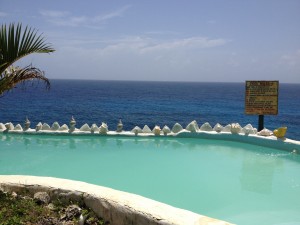
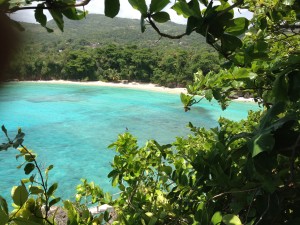
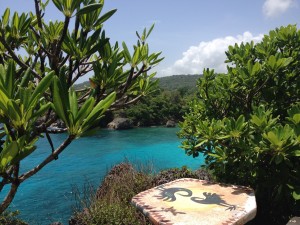
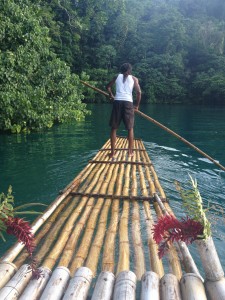
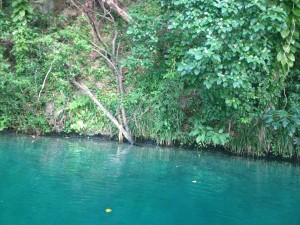
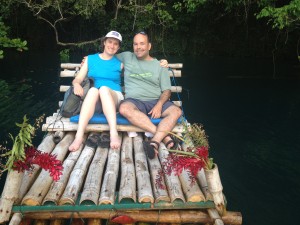
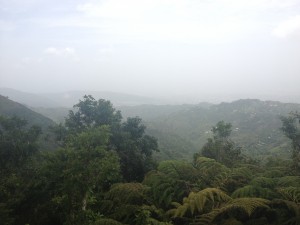
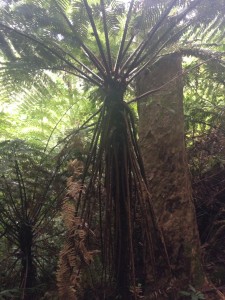
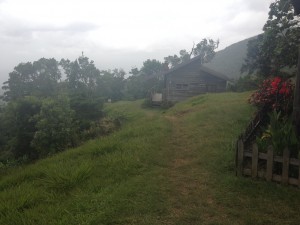
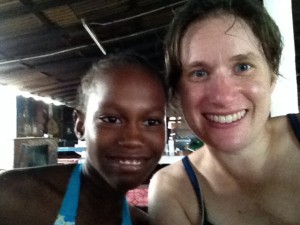
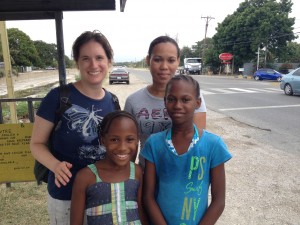
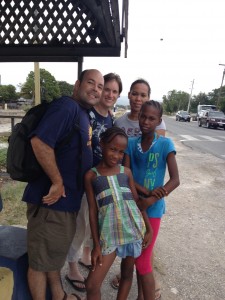
July 5, 2014 at 11:38 pm
I totally know what you are talking about with the buses.. They put people on the roof here in Guatemala. Great read, you look good!